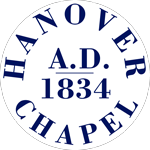Pastors
The Baptists were the earliest and most numerous of the early Nonconformists sects in England. There were certainly Baptist “churches” as early as 1589. A Kent & Sussex Baptist Association was formed of the local churches, and around 1733 a meeting house was built on Mount Ephraim in Tunbridge Wells. The Society became extinct in 1813, and the Chapel was converted into cottages.
It was not until the nineteenth century that the Baptists again formed themselves into a organised body. It appears that about 1833 some few serious minded persons occasionally assembled for worship, at first in a schoolroom in Grosvenor Road, but finding their numbers speedily increase and a subscription being made for the purpose, a building of some architectural interest was erected in Hanover Road. It was opened in 1834.
(from C. Strange, Baptists in Kent & Sussex)
The following is recorded in the old Church Book:
It has pleased Almighty God to visit this part of the world with the light of His preached word, and by His Holy Spirit to bring many to a saving and sanctified knowledge of Himself. Yet prior to the year 1834 there was no church in this place of the Particular Baptist Denomination, but there were several residents of that persuasion who, with the surrounding churches, desired greatly to see one planted herein. Often did they cry to the Lord that He would in His providence so order it that there might be a place and a people to worship in all the commandments of the Lord blameless.
Henry Kewell (Pastor 1835-1850)
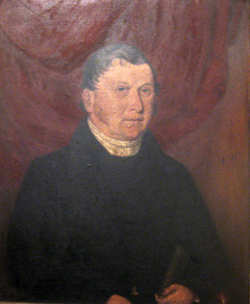 The desire for a godly Pastor now animated the little Church and a prayerful invitation was extended to Mr Henry Kewell to supply in the pulpit at Hanover. His ministry was received with acceptance and profit and he was given a call to the pastorate. This he was led to accept and ministered (1835) and continued for 15 years. Towards the end of 1850 he was taken with dropsy of the heart and passed away on December 16th.
The desire for a godly Pastor now animated the little Church and a prayerful invitation was extended to Mr Henry Kewell to supply in the pulpit at Hanover. His ministry was received with acceptance and profit and he was given a call to the pastorate. This he was led to accept and ministered (1835) and continued for 15 years. Towards the end of 1850 he was taken with dropsy of the heart and passed away on December 16th.
It is recorded
He was a man of unbending integrity; he was constitutionally of a somewhat reserved and cautious disposition, very quiet and unostentatious in his deportment. But he was a man of keen, deep, and tender feelings, as the big tear that often rolled down his manly face did testify. During the short time he was confined to his bed, it pleased the Lord to grant him solid peace in the truths he had constantly proclaimed to others. They became his support in the time when heart and flesh were failing, till he departed almost without a groan or sigh, as if ‘His Maker kissed his soul away, And laid his flesh to rest’.
John Austin (Pastor 1852-1855)
Mr John Austin supplied the pulpit during 1851 and was ‘solemnly, cordially, and explicitly invited to the immediate exercise of the pastoral charge over us in word and doctrine’ in August of that year. He commenced his pastorate in 1852 but sadly as he expressed it ‘there was a lack of spiritual prosperity in the Church’ and he resigned on June 14th 1855.
Daniel Whitaker (Pastor 1857-1871)
Two years later Mr Daniel Whitaker was given a direct call to be their pastor which he felt led to accept and Recognition Services were held on June 23rd 1857.
In August 1869 it was decided to use Gadsby’s Selection of Hymns.
A letter of resignation was received from Mr Whitaker on March 13th 1871 and so his pastorate also ceased.
William Webb (Pastor 1871-1874)
There followed the short pastorate of Mr William Webb
John Newton (Pastor 1878-1914)
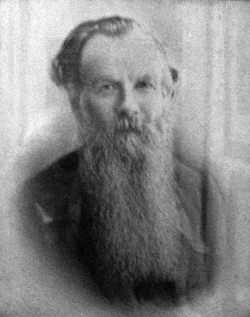 There followed four years in which the pulpit was supplied by ministers from local churches until in
There followed four years in which the pulpit was supplied by ministers from local churches until in
1878 the Church was constrained to ask Mr John Newton to the pastorate, which he felt led to accept after much prayerful concern.
Mr Newton was born at Glyndebourne in Sussex, but when only a year old his father obtained a situation at Danehill as a coachman to a Colonel Davis.
John continued in a state of ignorance as to his own sinfulness until in 1862 when in the providence of God he began to attend the Dicker Chapel, where after a marked change in his conduct, he and his wife were baptised. He commenced to preach in 1868. He and his wife lived at Westham in Sussex and later at Southborough. They lived in very poor circumstances but the Lord appeared for them time and time again to provide for their needs. “I do pray” he says , “that these marvellous mercies may ever have the tendency to humble my heart, and remind me of the Lord the Giver, and that they may ever aid me in sympathizing with His dear, tried, tempted people”.
In spite of many struggles with poverty, he was very reluctant to burden the Church with added expense, and his gracious humility is wonderfully displayed in his acceptance of gifts by friends, who under the Lord supplied his needs.
Mr Newton’s was a gracious and useful pastorate of thirty six years, being much used of the Lord for the spiritual profits of hearers at Hanover.
The following has been taken from the Gospel Standard of 1915—
John Newton the beloved Pastor of Hanover Chapel, Tunbridge Wells passed from all that is sinful, mortal, and painful, changing to his eternal rest just after midnight on Sunday, November 15th 1914.
For years he had become increasingly weak, and often preached when scarcely able to get into the pulpit. For a time we hoped he might rally and preach again, but his weakness increasing, it appeared evident the Lord was gently taking his tabernacle down. It was a favour to spend a little time with him. His troubled breathing and pains were accompanied with continual thanksgiving and supplication. Verses of Scripture and hymns flowed from his heart and lips. His last day here was very trying, nothing seemed to relieve his severe pains and exhaustion. About midnight he was heard to exclaim, “He’s come”, and his face testified to much inward joy. Very soon afterward he breathed his spirit into his dear Redeemer’s hands.
Seth Pack (Pastor 1918-1936)
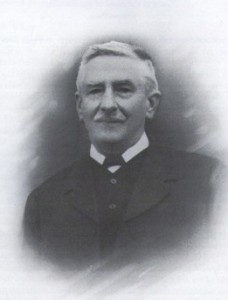 There was now a period of Supplies, until another Pastor in the person of Mr Seth Pack was granted unto them. He was born in very humble circumstances, his father Joseph being the youngest of five sons. Brought up to attend the Church of England , but after a time became connected with the Particular Baptists at Godmanchester. Joseph later obtained a situation at Robertsbridge in Sussex, and while there married Elizabeth Marriott. They later returned to Wellingborough where Seth was born on May 17th 1866. After leaving school he began to learn the boot-and shoe making at home , but became vain and often unruly, which brought forth his father’s reproofs. In 1883 when provoked by his brothers he uttered a awful curse. His father heard this, and the faithful warning came:
There was now a period of Supplies, until another Pastor in the person of Mr Seth Pack was granted unto them. He was born in very humble circumstances, his father Joseph being the youngest of five sons. Brought up to attend the Church of England , but after a time became connected with the Particular Baptists at Godmanchester. Joseph later obtained a situation at Robertsbridge in Sussex, and while there married Elizabeth Marriott. They later returned to Wellingborough where Seth was born on May 17th 1866. After leaving school he began to learn the boot-and shoe making at home , but became vain and often unruly, which brought forth his father’s reproofs. In 1883 when provoked by his brothers he uttered a awful curse. His father heard this, and the faithful warning came:
“Be careful, my boy, for what a solemn thing it will be for you if that curse falls on you”. This caused him much fear and trembling and he was taken seriously ill, and it was feared he would die. The Lord mercifully spared him, which raised in him a faint hope of obtaining mercy.
In January of 1915 he received an invitation from Hanover to preach there. His labours from the start, and during his probation were much blessed, and he commenced the pastorate in May 1918.
His ministry was greatly appreciated, and he was loved by his people at Hanover, and ministered among them until 1936. He cherished a desire to return unto his old home, which he did, although he supplied at Hanover whenever possible.
So closed a very profitable period of 18 years ministry.
Samuel Curtis (Pastor 1946-1959)
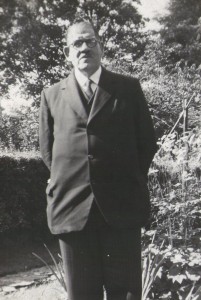 The cause now remained pastorless for ten years, when Mr Samuel Curtis was appointed in 1946.
The cause now remained pastorless for ten years, when Mr Samuel Curtis was appointed in 1946.
He ministered at Hanover for 13 years, and as Mr F.L. Gosden said of him “Behold an Israelite indeed, in whom is no guile!” His preaching was as with the ability that God giveth, and was therefore made a blessing to many a broken-hearted sinner.
At a Church Meeting in 1944 a letter was read from Mr Curtis respecting his leaving the Pastorate at Brockham Green. On his visits to Tunbridge Wells he had been heard very acceptably, and it was proposed and seconded that he be asked to give extra Sabbaths with a view to the pastorate.
After much hesitation not having received any direct word from the Lord, and feeling much his “unsuitable condition” for such a position, he felt to decline the invitation, but with encouragements later, he was made willing to take up the Pastorate.
An announcement was made from the desk on April 28th (1946) that henceforth Mr S Curtis will be known as our Pastor.
There followed 13 years of profitable ministry, but on account of ill-health he resigned at the end of 1959.
Clement Dobell (Pastor 1979-1984)
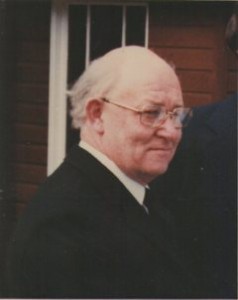 Another 20 years passed before the Church extended an invitation to the pastorate to Mr C Dobell.
Another 20 years passed before the Church extended an invitation to the pastorate to Mr C Dobell.
Mr Dobell had from his early days attended Hope Chapel, Blackboys , and had married the Pastor’s daughter. The way despite much opposition was made for them to come to Tunbridge Wells and to attend Hanover. He joined the church in 1969 having given a gracious testimony of the Lord’s dealings with him over a number of years. He was later appointed a deacon, and was sent into the ministry in 1976. Mention was made of the help received from the word “Certainly I will be with thee”. Mr Frank Gosden conducted the Church meeting and remarked — I do believe the Lord will go before you, and make you a gracious and useful minister. Addressing the Church he said ‘He will need your prayers, and it may be the Lord will make him very useful in this Church, and among this people’.
Later an invitation was extended to Mr C Dobell to take up the pastorate of the cause, and he commenced his labours in 1979.
Mr Dobell ministered until August 1984, when he was suddenly called home when attending to maintenance work at the chapel.
On the previous Lord’s Day at the close of the services at the Lord’s Supper, a few verses of Hymn 802 Gadsby’s was sung and it is remembered how that he closed the benediction with a double “Amen”. So ended the labours of a much loved Pastor and faithful servant of the Lord.
Harold Jempson (Pastor 1992- 2016)
.
